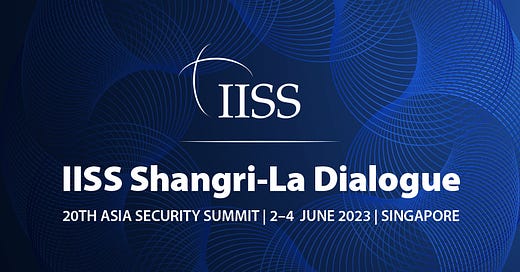
Hello,
The IISS Shangri La Dialogue, the Glastonbury of foreign policy gatherings, took place this weekend in Singapore. Like Glastonbury, I once again failed to get a ticket, so I spent the bulk of the weekend pouring over transcripts between moving flats. Unsurprisingly, much of what was said by those present is very much worthy of a British policymaker’s time. Even more unsurprisingly, little of it made its way into most of the British print media or the wider political discourse, so what follows is an effort to draw the main points from every speech delivered at the conference in a succinct manner for those who are time-poor.
This includes speeches from leaders and senior officials from the United States, China, Singapore, Japan, Australia, Britain and a number of other countries. The United Kingdom was represented by Defence Secretary Ben Wallace and Minister for the Indo-Pacific Anne-Marie Trevelyan, who both delivered speeches and met with various counterparts on the sidelines.
A couple of observations from the get-go. First, it is really worth striking how similar Australian and British speeches have become on certain China-related themes. For example, British Foreign Secretary James Cleverly recently mentioned China’s military build up as an area of concern, something which features at length again in Australian Deputy Prime Minister Richard Marles's speech. Second, those who gushed over a PRC charm offensive post the Covid-19 re-opening would do well to read representative General Li Shangfu’s speech. Third, I was struck by how many regional leaders and senior officials called for the establishment of crisis communication hotlines between the United States and China as a priority. Finally, three islands cut through the at times bloated rhetoric to provide a clear-eyed assessment of the issues facing them. A Fijian minister warned that “While some nations are in disputes over their maritime boundaries, we in the Pacific risk being left with nothing even to dispute over.” Timor-Leste’s President stated that “[i]f the global south is not supported in meaningful ways to recover their livelihoods, no walls will be thick enough and high enough to prevent millions of destitute and desperate from continuing to flock to the privileged north,” and Singapore’s Defence Minister emphatically argued that “the single most important thing that Japan can do for the stability of ASEAN and Asia is to improve its relations with China.”
- Sam Hogg, Editor
Today’s paid briefing for policymakers and CEOs a short, sharp analysis of what major world leaders and senior officials said over the last 48 hours.
If you have a gov.uk or parliament.uk email, all Beijing to Britain briefings and notes are free for you. Simply enter your email below.



